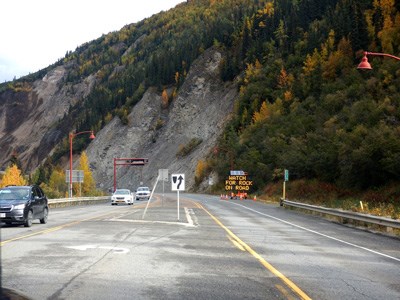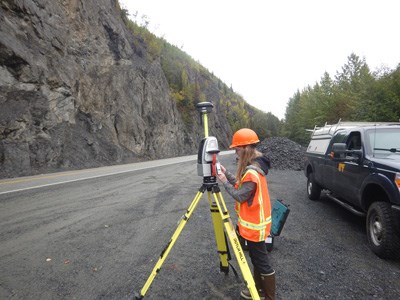Research Interests
- Behavior of unfrozen water in frozen soils
- Frost heaving
- Slope stability in frozen ground
- Thermal analysis of engineered structures over frozen ground
Selected Funded Research Project
- Senior Personnel. Track 2—Center Operations: Center for Land-Surface Hazards (CLaSH).
Darrow’s main contribution to this center will be through the Alaska Community Observatory in southeast Alaska, installing instrumentation within a debris flow fan and characterizing the lithology of its catchment, the results of which will contribute to mitigation alternatives to reduce the risk of the community living on the Klukwan fan.
Funding agency: National Science Foundation (UAF: $593,114)
- PI. RAPID: Investigating the Triggers of the 2023 Wrangell, Alaska Landslides.
For this project, the research team investigated the possible triggers of the fatal 11-Mile Slide, which occurred during a significant winter storm.
Funding agency: National Science Foundation ($48,021)
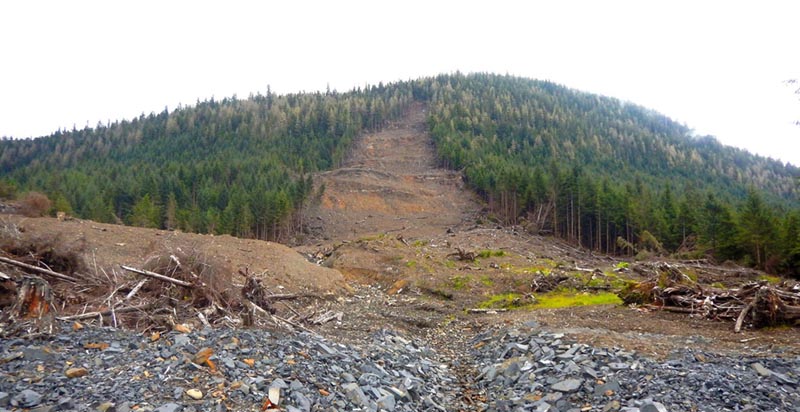
The 2023 11-Mile landslide in Wrangell, Alaska.
- PI. RAPID: Characterizing the Trigger and Evolution of the December 2020 Haines, Alaska Landslide.
The research team investigated the triggers of the deadly 2020 Beach Road Landslide, while also documenting dozens of other landslides that occurred in the Haines area as a result of the historic December 2020 atmospheric river.
Funding agency: National Science Foundation (UAF: $62,249)
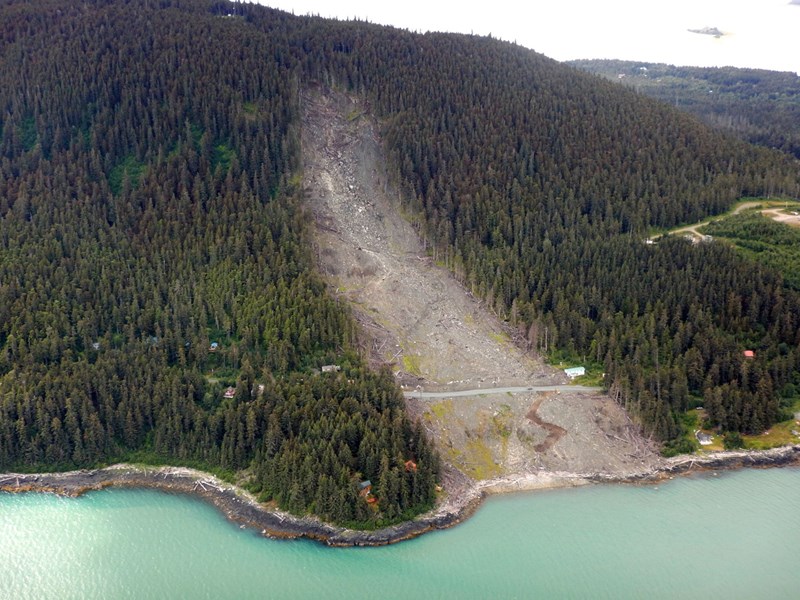
The 2020 Beach Road landslide in Haines, Alaska.
FDL Research
Darrow has researched frozen debris lobes since 2011. Work has involved everything from mapping their catchments to monitoring movement rates to drilling and sub-surface instrumentation. More information about FDL research can be found at fdlalaska.org. Selected FDL research projects are listed below:
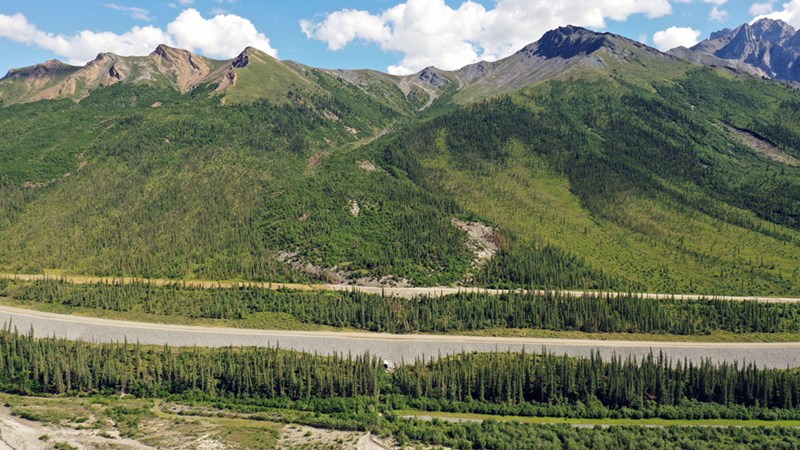
The toe of FDL-A has reached the abandoned Dalton Highway (photograph from 2024).
- Co-PI. NSF-SNSF: HOOLGOYH: Deciphering Long-term Effects of Global Warming on Permafrost Instability in the Brooks Range, Alaska.
While we can measure current rates of movement, what was the movement of the FDLs in the past? The trees record some of that story in their annual growth rings. This project investigates the role of climate on long-term FDL movement.
Funding agency: National Science Foundation / Swiss National Science Foundation (UAF: $399,960)

FDL movement causes trees to lean and correct (left). This movement is recorded in the tree’s reaction wood (right).
- PI. 2025 Modeling and Monitoring of FDL-A.
Funding Agency: Alyeska Pipeline Service Company ($226,449)
- PI. 2024 Analysis and Modeling of FDL-A.
Funding Agency: Alyeska Pipeline Service Company ($174,615)
- PI. 2023 Subsurface Investigation and Soil Property Testing of FDL-A, Phase 2.
Funding Agency: Alyeska Pipeline Service Company ($415,112)
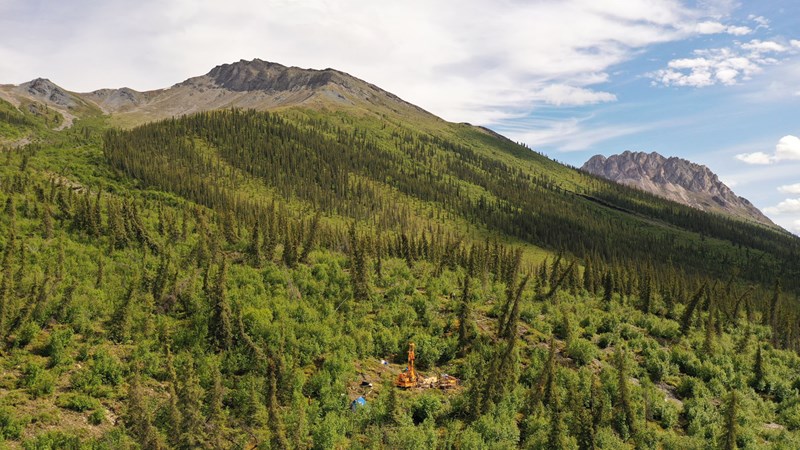
Drilling on FDL-A in 2023.
- PI. 2022 Subsurface Investigation and Soil Property Testing of FDL-A.
Funding Agency: Alyeska Pipeline Service Company ($423,588)
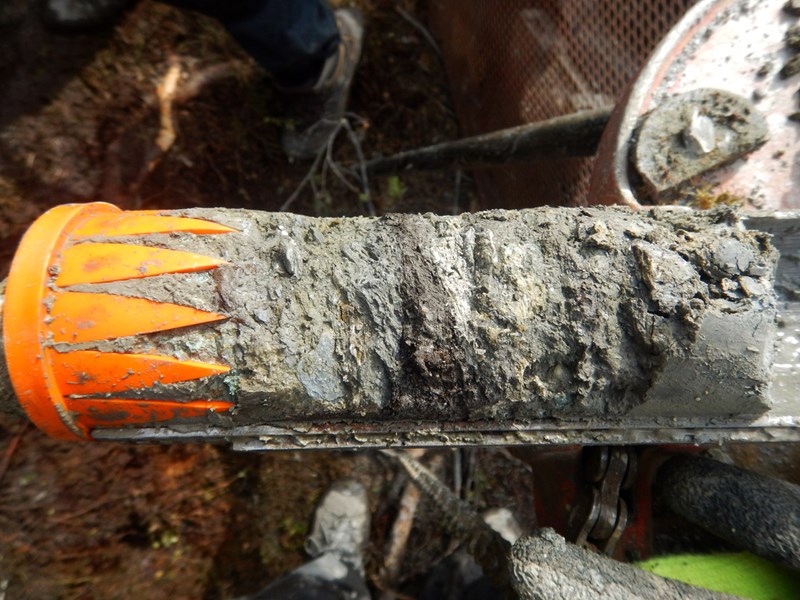
An example of the frozen silty sand with gravel that makes up the frozen debris lobes.
- PI. Acquisition and Analysis of Geophysics on FDL-A.
Funding Agency: Alyeska Pipeline Service Company ($116,326)
- PI. Developing a Framework for Forecasting Movement and Trajectory of FDL-A.
Funding Agency: Alyeska Pipeline Service Company ($37,942)
- PI. Landslide Collides with Highway: Measuring Its Impacts to Inform Future Mitigation.
Funding Agency: Alaska Department of Transportation and Public Facilities ($243,500)
Graduate Students Advised
- Claire Anovick – M.S. Geological Engineering
Thesis: Monitoring surficial change and forecasting subsurface thermal properties of frozen debris lobes.
Graduated: 2025
- Christopher Kalev – M.S. Geological Engineering
Thesis: Geotechnical investigation of sand flow slides, Haines, Alaska.
Graduated: 2025
- Victoria Nelson – M.S.Geological Engineering
Thesis: An analysis of cataloged December 2020 landslides near Haines, Alaska.
Graduated: 2023
- Jaimy Schwarber - M.S. Geological Engineering
Landslides in the Fairbanks North Star Borough, Alaska: Inventory Map and Tanana 440 Landslide Assessment.
Graduated: 2021.
- Rui Guo - M.S. Geological Engineering
Project: Analysis of Cation-treated Clay Microstructure Using Zeta Potential and X-ray Diffraction.
Graduated: December 2018.
- Javed Miandad – M.S. Geological Engineering
Thesis: Landslide Mapping using Multiscale LiDAR Digital Elevation Models.
Graduated: August 2018.
- Aaron Kruse – M.S. Geological Engineering
Thesis: Analysis of Unfrozen Water in Cation-Treated, Fine-Grained Soils Using the Pulse Nuclear Magnetic Resonance (P-NMR) Method.
Graduated: December 2016.
- Jocelyn Simpson – M.S. Geological Engineering.
Thesis: Site Investigation, and GIS and Slope Stability Analysis of a Frozen Debris Lobe, South-Central Brooks Range, Alaska. Graduated: August 2015.
- David Jensen – M.S. Geological Engineering.
Thesis: Performance of an Air Convection Embankment over Ice-rich Permafrost: Instrumentation, Monitoring, and Modeling. Graduated: May 2015.
- Kyle Obermiller – M.S. Geological Engineering.
Thesis: Investigation of a Landslide in Discontinuous Permafrost near Chitina, Alaska.
Graduated: December, 2011.
Selected Publications
Link to Scholar Citation Page
- Darrow, M. M. and Jacobs, A. (2025). "Read all about it! A review of more than a century of Alaskan landslides as recorded in periodicals." Landslides.
- Rouyet, L., Bolch, T., Brardinoni, F., Caduff, R., Cusicanqui, D., Darrow, M., Delaloye, R., Echelard, T., Lambiel, C., Ruiz, L., Schmid, L., Sirbu, F., Strozzi, T. (2025). “Rock glacier inventories (RoGI) in 12 areas worldwide using a multi-operator consensus-based procedure.” Earth System Science Data: 17(8).
- Bray, M. T. and Darrow, M. M. (2025). “Creep behavior of ice-rich warm peaty soils along the Trans Alaska Pipeline System at Lost Creek, Alaska.” Canadian Geotechnical Journal: 62, 1-18.
- Darrow, M. M., Daanen, R. P., Gould, M. C. (2024). “Documenting the collision of a landslide in permafrost with a highway embankment.” Environmental and Engineering Geoscience: 30 (1-2), 1-18.
- Markus, S. J., Wartman, J., Olsen, M., Darrow, M. M. (2023). “Lidar-derived rockfall inventory—an analysis of geomorphic evolution of rock slopes and modifying the Rockfall Activity Index (RAI).” Remote Sensing: 15(17), 4223.
- Stephani, E., Darrow, M. M., Kanevskiy, M., Wuttig, F., Daanen, R. P., Schwarber, J. A., Doré, G., Jorgenson, M. T., Croft, P., Drage, J.S. (2023). “Hillslope erosional features and permafrost dynamics along infrastructure in the Arctic Foothills, Alaska.” Permafrost and Periglacial Processes: 34, 208-228.
- Schwarber, J. A., Darrow, M. M., Daanen, R. P, Stevens, D. S. P. (2022). “Loess is more: field investigation and slope stability analysis of the Tanana 440 landslide, Interior Alaska.” Environmental and Engineering Geoscience: 28(3), 255-273.
- Darrow, M. M., Nelson, V. A., Grilliot, M., Wartman, J., Jacobs, A., Baichtal, J. F. (2022). "Geomorphology and initiation mechanisms of the 2020 Haines, Alaska landslide." Landslides.
- Miandad, J., Darrow, M. M., Hendricks, M. D., Daanen, R. P. (2020). “Landslide mapping using multiscale LiDAR digital elevation models.” Environmental & Engineering Geoscience: 26(3), 1-21.
- Darrow, M. M. and Lieblappen, R. M. (2020). “Visualizing cation treatment effects on frozen clay soils through µCT scanning.” Cold Regions Science and Technology: 175.
- Darrow, M. M., Guo, R., Trainor, T. P. (2020). “Zeta potential of cation-treated soils and its implication on unfrozen water mobility.” Cold Regions Science and Technology: 173.
- Gong, W., Darrow, M. M., Meyer, F. J., Daanen, R. P. (2019). “Reconstructing movement history of frozen debris lobes in northern Alaska using satellite radar interferometry.” Remote Sensing of Environment: 221, 722-740.
- Kruse, A. M., Darrow, M. M., Akagawa, S. (2018). “Improvements in measuring unfrozen water in frozen soils using pulse nuclear magnetic resonance (P-NMR) method.” Journal of Cold Regions Engineering: 32(1), 7 p., doi:0.1061/(ASCE)CR.1943-5495.0000141
- Darrow, M. M., Daanen, R. P., Gong, W. (2017). “Predicting movement using internal deformation dynamics of a landslide in permafrost.” Cold Regions Science and Technology: 143, 93-104, https://doi.org/10.1016/j.coldregions.2017.09.002
- Kruse, A. M. and Darrow, M. M. (2017). “Adsorbed cation effects on unfrozen water in fine-grained frozen soil measured using pulsed nuclear magnetic resonance.” Cold Regions Science and Technology: 142, 42-54.
- Darrow, M. M., Gyswyt, N. L., Simpson, J. M., Daanen, R. P., Hubbard, T. D. (2016). “Frozen debris lobe morphology and movement: an overview of eight dynamic features, southern Brooks Range, Alaska.” The Cryosphere, 10, 977-993, doi:10.5194/tc-10-977-2016.
- Darrow, M. M., and Jensen, D. D. (2016). “Modeling the performance of an air convection embankment (ACE) with thermal berm over ice-rich permafrost, Lost Chicken Creek, Alaska.” Cold Regions Science and Technology, 130, 43-58.
- Simpson, J. M., Darrow, M. M., Huang, S. L., Daanen, R. P., Hubbard, T. D. (2016). “Investigating movement and characteristics of a frozen debris lobe, South-Central Brooks Range, Alaska.” Environmental and Engineering Geoscience, 22(3), 259-277.
- Darrow, M. M., and Jensen, D. D. (2014). “Cold region applications for in-place inclinometers based on microelectromechanical systems technology.” Transportation Research Record, 2433, 1-9.
- Darrow, M. M. (2013). “Automated MEMS-based in-place inclinometers.” Geotechnical News, 31(3), 27-30.
- Obermiller, K. E., Darrow, M. M., Huang, S. L., Chen, G. (2013). “Site investigation and slope stability analysis of the Chitina Dump Slide (CDS), Alaska.” Environmental and Engineering Geoscience, 19(1), 27-40.
- Daanen, R. P., Grosse, G., Darrow, M. M., Hamilton, T. D., Jones, B. M. (2012). “Rapid movement of frozen debris-lobes: implications for permafrost degradation and slope instability in the south-central Brooks Range, Alaska.” Natural Hazards and Earth System Sciences, 12, 1521-1537.
- Darrow, M. M., Bray, M. T., Huang, S. L. (2012). “Analysis of a deep-seated landslide in permafrost, Richardson Highway, South-Central Alaska.” Environmental and Engineering Geoscience, 18(3), 261-280.
- Darrow, M. M. (2011). “Thermal modeling of roadway embankments over permafrost.” Cold Regions Science and Technology, 65, 474-487.
- Darrow, M. M., Huang, S. L., Akagawa, S. (2009). “Adsorbed cation effects on the frost susceptibility of natural soils.” Cold Regions Science and Technology, 55, 263-277.
- Darrow, M. M., Huang, S. L., Shur, Y., Akagawa, S. (2008). “Improvements in frost heave laboratory testing of fine-grained soils.” Journal of Cold Regions Engineering, 22(3), 65-78.
Doctor of Philosophy, Engineering: Arctic Engineering
May 2007
University of Alaska Fairbanks
Bachelor of Science Degree, Geological Engineering
December 2002
University of Alaska Fairbanks
Teachers for Alaska Certification Program, Math/Science
May 1997
University of Alaska Fairbanks
Master of Science Degree, Geology
December 1995
University of Alaska Fairbanks
Bachelor of Science Degree, Geology
August 1993 University of Washington
Appointments
Professor, 2018-present
Department Chair, Civil, Geological and Environmental Engineering 2020-2023
Department Chair, Mining and Geological Engineering 2015-2019
Associate Professor, 2013-2018
Assistant Professor, 2008-2013
Department of Mining and Geological Engineering, University of Alaska Fairbanks
Geotechnical Engineering Assistant, 2005-2008
Graduate Intern, 2002-2005
Alaska Department of Transportation and Public Facilities, Fairbanks, Alaska
Teaching Experience
Teaching Assistant, 2002
Department of Mining and Geological Engineering, University of Alaska Fairbanks
Earth and Space Science Instructor, 1995, 1996, 1997, 1998, 2000
Upward Bound Math/Science, Fairbanks, Alaska
Secondary Teacher, 1997 - 1999
Minchumina Community School, Iditarod Area School District, Lake Minchumina, Alaska
Graduate Teaching Assistant, 1993 - 1995
Department of Geology and Geophysics, University of Alaska Fairbanks
Courses Taught
- GE101 – Introduction to Geological Engineering
- GE 261 - General Geology for Engineers
- GE 365 - Geological Materials Engineering
- GE 375 - Principles of Engineering Geology and Terrain Analysis
- GE 376 - GIS Applications in Geological and Environmental Engineering
- GE 381/382 - Field Methods and Applied Design I and II
- GE 430 - Geomechanical Instrumentation
- GE440 – Slope Stability
- GE441 – Geohazard Analysis
- GE480 – Senior Design
- GE626 – Thermal Geotechnics
- GE 692 - Graduate Seminar
- ES 208 – Mechanics
- ES 209 - Statics







